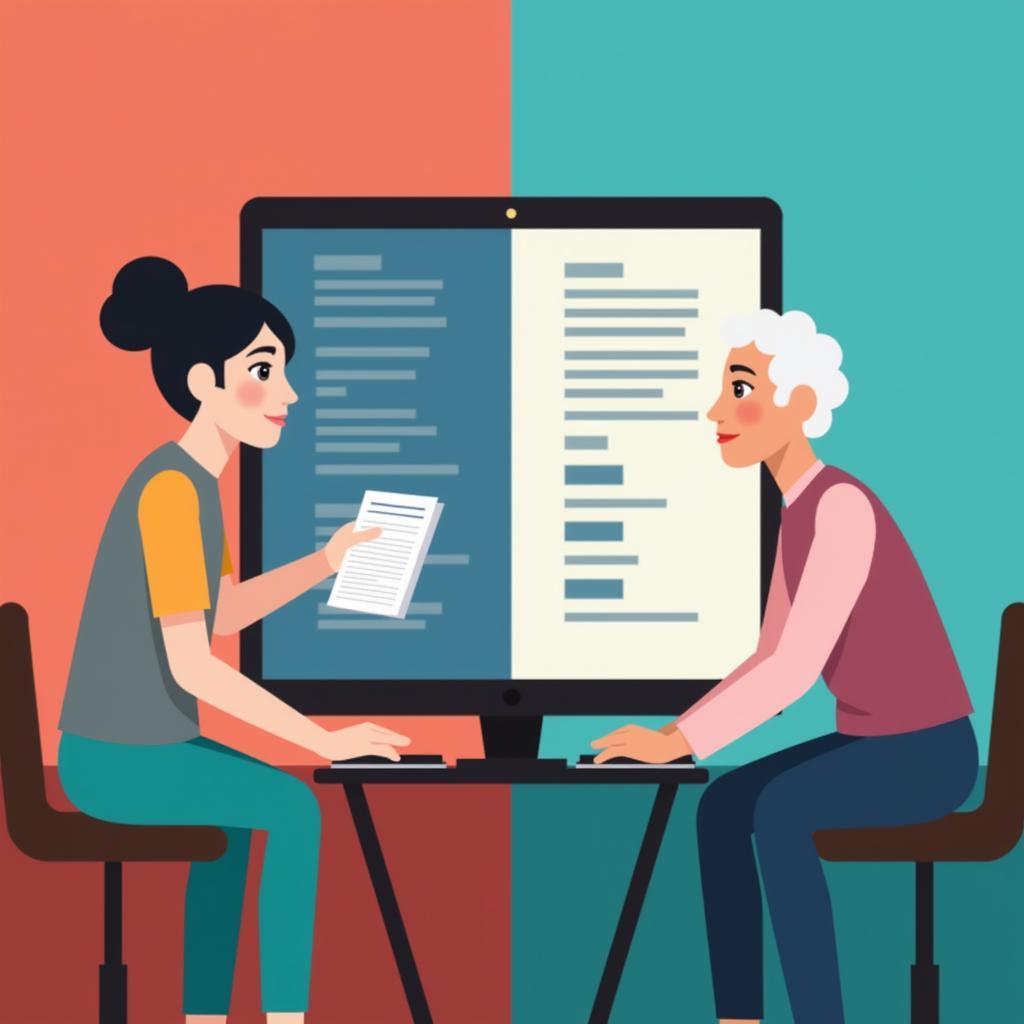Career assessment tools are increasingly popular, helping individuals identify potential career paths and employers find suitable candidates. But a crucial question lingers: does race and age affect career assessment tool results? This article dives deep into this complex issue, exploring the potential biases, implications, and solutions for ensuring fairness and accuracy in career assessments.
Understanding Career Assessment Tools and Potential Biases
Career assessments typically evaluate personality traits, skills, interests, and values to suggest suitable career options. While designed to be objective, concerns exist about potential biases related to race and age. These biases can stem from various sources, including the tool’s design, the underlying data used for its development, and the interpretation of results.
How Race Might Influence Results
 Race Bias in Career Assessment Tools
Race Bias in Career Assessment Tools
Some assessments may inadvertently reflect cultural biases. For example, questions about leadership styles or communication preferences might be interpreted differently across cultures. Moreover, if the normative data used to develop the tool predominantly represents one racial group, the results might not accurately reflect the strengths and potential of individuals from other racial backgrounds. This could lead to underrepresentation in certain career fields and reinforce existing societal inequalities.
The Impact of Age on Assessment Outcomes
 Age Bias in Career Assessment Tools
Age Bias in Career Assessment Tools
Age can also influence assessment outcomes. Older individuals might have different work experiences and values compared to younger generations. Assessments that prioritize certain skills or traits valued in contemporary workplaces might disadvantage older workers with extensive experience in different areas. Furthermore, the format of the assessment itself could pose challenges. Older individuals less familiar with online platforms might struggle with digital assessments, affecting their performance.
Mitigating Bias and Ensuring Fair Assessment Practices
Recognizing and addressing potential biases is crucial for ensuring the fairness and effectiveness of career assessment tools. Several strategies can help mitigate these issues:
- Diverse Normative Data: Developers should use diverse and representative samples when creating and validating assessment tools. This ensures the tool accurately reflects the characteristics and potential of individuals from different racial and age groups.
- Culturally Sensitive Questioning: Carefully crafting assessment questions to avoid cultural biases is essential. This involves reviewing questions for potential misinterpretations and adapting language to ensure clarity across cultures.
- Multiple Assessment Methods: Employing a combination of assessment methods, such as interviews, work samples, and personality tests, can provide a more holistic and less biased evaluation of an individual’s potential.
- Transparency and Explanation: Providing clear explanations of how the assessment works and how results are interpreted can help individuals understand the process and identify potential biases.
- Regular Review and Updates: Career assessment tools should be regularly reviewed and updated to reflect changing workplace dynamics and ensure they remain relevant and unbiased.
“It’s critical to remember that career assessment tools are just one piece of the puzzle,” says Dr. Amelia Hernandez, a leading Industrial-Organizational Psychologist. “They should be used in conjunction with other information, such as work experience, education, and personal goals, to make informed career decisions.”
Does a Career Assessment Consider My Background?
Ideally, a well-designed career assessment should not directly consider your racial or age background. The focus should be on your skills, interests, and aptitudes.
What If I Feel the Results Are Inaccurate?
If you believe your results are inaccurate due to bias, discuss your concerns with a career counselor or the assessment provider. They can help you interpret the results in context and explore alternative assessment options.
 Fair Career Assessment Practices
Fair Career Assessment Practices
“Don’t let a potentially biased assessment discourage you,” advises Dr. Hernandez. “Focus on your strengths and explore career paths that align with your values and aspirations.”
Conclusion
While career assessment tools can be valuable resources, it’s crucial to acknowledge the potential impact of race and age on results. By implementing strategies to mitigate bias and promoting fair assessment practices, we can ensure these tools help individuals from all backgrounds reach their full potential. Addressing these challenges is essential for creating a more equitable and inclusive workforce. Remember to consider these factors when using or developing career assessments to create a fairer and more effective process for everyone.
FAQ
- Are all career assessments biased? Not all assessments are inherently biased, but the potential for bias exists. It’s essential to choose carefully and consider the factors discussed.
- How can I find unbiased career assessments? Look for assessments developed with diverse normative data and those that offer transparency in their methodology.
- What should I do if I suspect bias in an assessment? Discuss your concerns with a career counselor or the assessment provider.
- Can I challenge the results of a career assessment? You can discuss your concerns and seek further guidance from career professionals.
- Are there alternative methods for career exploration? Yes, informational interviews, job shadowing, and internships can provide valuable insights into different career paths.
- How can employers ensure fair assessment practices? Employing diverse assessment methods and focusing on skills and abilities rather than demographics can help promote fairness.
- What is the role of career counseling in interpreting assessment results? Career counselors can help individuals understand their results in context and navigate potential biases.
If you need further assistance, contact us via WhatsApp: +1(641)206-8880, Email: [email protected] or visit us at 910 Cedar Lane, Chicago, IL 60605, USA. We have a 24/7 customer support team.

Leave a Reply